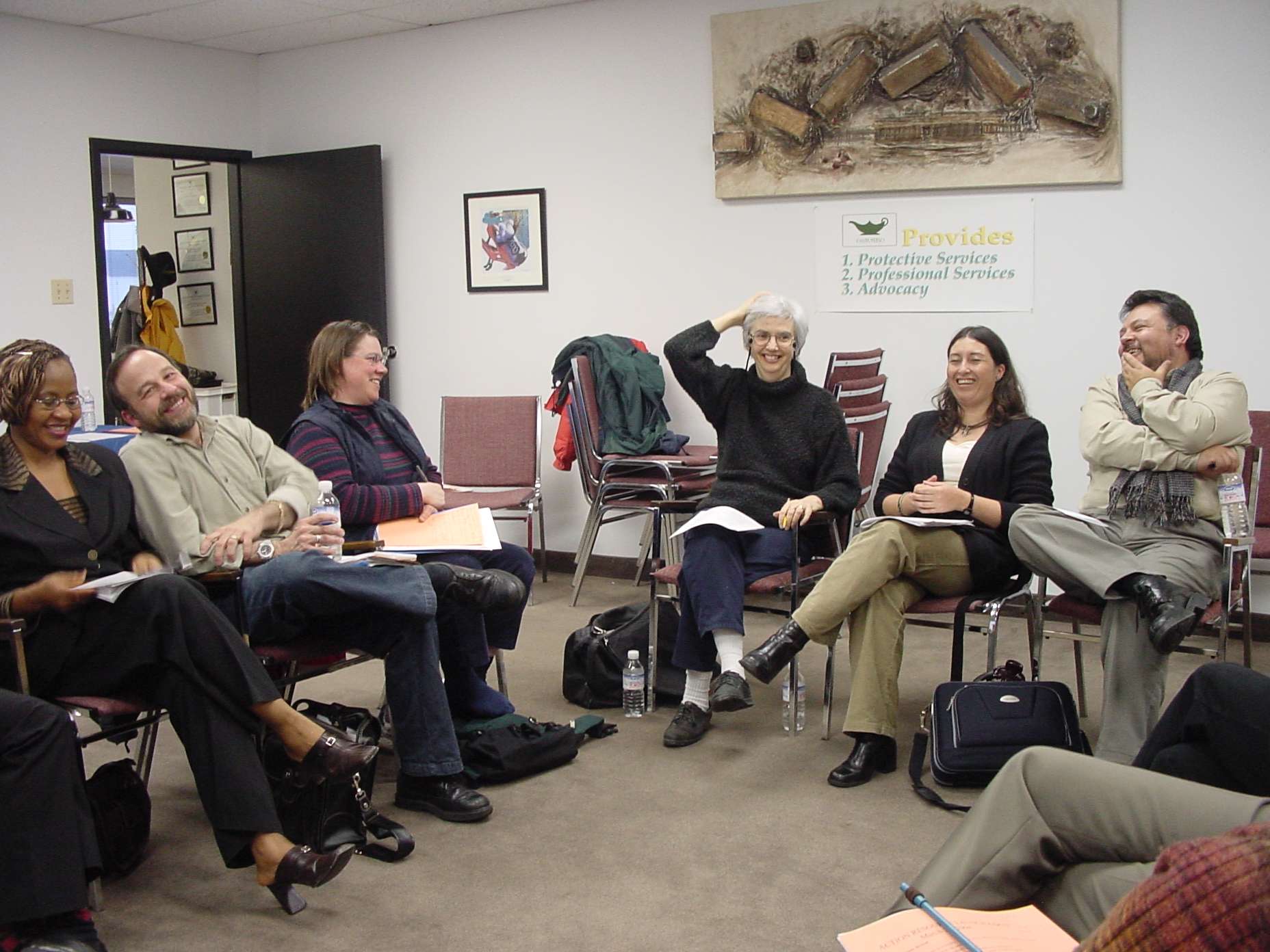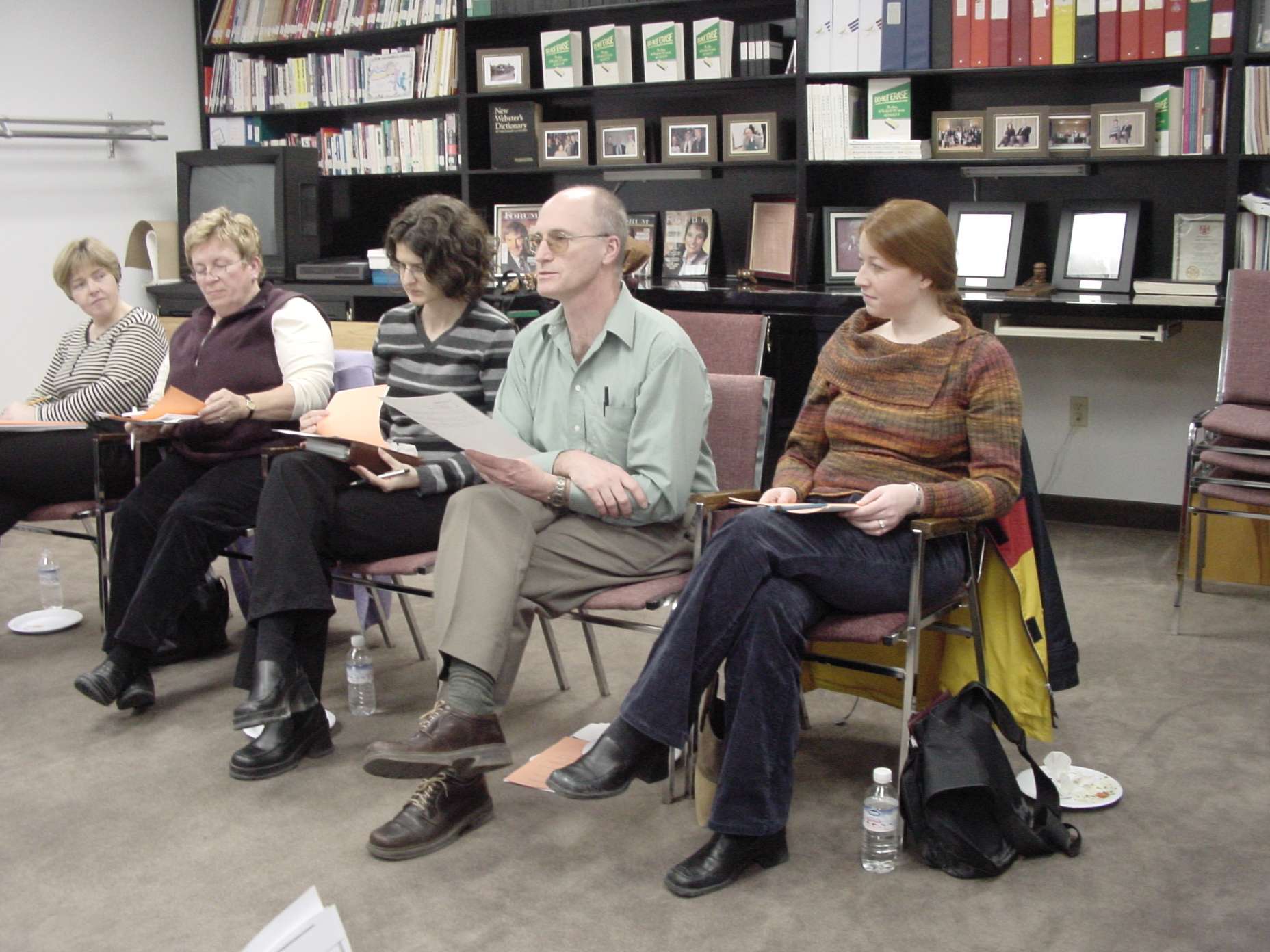| Despite District 11's active participation in
the rescue of a family from Colombia, when Liliany came to talk to us, her
stories filled us with admiration for the courage of those, who like her,
try to help farmers, unionized labour and teachers who have been
particular targets of para-military death squads. Liliany is a teacher, a
sociologist, a farmer’s daughter, a documentary film-maker and a
steadfast worker for the rights of Colombians. Her visit to the Toronto
area, to District 11 and other locations is an attempt for her to
reconnect with some members of the Fenuagro and other Colombian unions in
exile in Canada, to alert us to the continuing abuses of Human Rights in
Colombia, and to enlist our help in asking for the Canadian government to
turn its attention to injustices committed there.
Liliany arrived to a roomful of questions. The answers are based on her
responses, on information brought with her, and on other research. Before
her arrival, many had asked themselves questions such as:
 | If one of the women here were a flower worker, ie working at
"cut flowers" for stores here, how many hours would she work
a day, what would she get paid, what would be her working conditions,
what effect would her job have on her health?
 | Her hours would be 14 or more, she would be paid a pittance, but
exposed to chemical pesticides potentially affecting the health
especially of pregnant women. |
|
 | If the Colombian government knew you were going to make a documentary
about agriculture today in Colombia, what would they want to have in it?
 | Constructed images in staged scenes of happy workers in the
plantations of the transnational corporations. |
|
 | If the Colombian government knew you were going to make a
documentary about agriculture today in Colombia, what would they want
left out?
 | Demonstrations by campesinos demanding that their lands be
returned to them, defoliation of forests and the killing of crops
vital to the survival of rural areas, paramilitary squads
terrorizing villages. |
|
 | If the Colombian government knew you were going to make a documentary
about agriculture today in Colombia, what would they do to you?
 | Nothing! The reason why you create paramilitaries is to divert any
blame for dirty deeds including deaths and disappearances from the
government. " Leave this one to the paramilitary!" might be
their response. |
|
 | Who owns Colombia’s oil?
 | Colombia is a country rich in agricultural and mineral wealth.
Today, transnational corporations control most of it, enriching
themselves and a very small minority of Colombian who collude with
them for personal benefit. |
|
 | Why are there so many landless farmers in Colombia?
 | Campesinos have been displaced by transnational corporations.
Defoliation makes it more than a little difficult to grow anything
on the land. If you become known as an organizers of farmers, you
become a target for the paramilitary and need to move. |
|
 | Why are there so many guns in Colombia?
 | The new president has armed 20 000 more paramilitary troops to
increase the efficiency of the killings. |
|
 | Why are there so many transnational corporations in Colombia?
 | Colombia’s riches attract them. Negotiations with Colombian
unions can be fast-tracked for more favorable results; see also
"Would you like a Coke?" |
|
 | Would you like a Coke?
 | In a case being pursued by an American union in solidarity with
Colombian workers at a bottling plant where Coca-Cola is produced,
workers allege that the management team looked at a union offer on
the negotiating table, asked if they could confer in private and
left the room. Moments later, a paramilitary squad armed with guns
entered the room where the union team waited. All union negotiating
team members were shot. In short, no, I would not like a Coke, and,
in fact, would point out that unions in Canada and the USA are
encouraging their members to put pressure on Coke, including through
a boycott of all the company’s products. The case is still before
the courts in the USA. Liliany turned down our offer of a Coke. |
|
Liliany told us about the way in which Fenuagro, the farmers’ and
argicultural workers’ union tries to prevent the loss of all of its
leadership. When a death-squad targets a union leader, they move the
leader from one part of the country to another so as not to lose the
knowledge and skills of that person while preserving life. Only as a last
resort would they consider having a leader go into exile. Despite that,
CUT in Colombia and its equivalent, the CLC in Canada, agreed two years
ago that at least 50 union leaders were in such grave danger of torture
and death from paramilitaries that Canadian unions would undertake to
sponsor them as refugees to Canada.
Faced with "interminable questions" Liliany responded with
good humour. Yes, she would answer number 26. Yes, if people at the Human
Rights meeting had more questions, she would talk about the issues raised.
Would she like a Coke? Had she seen the "Coke Float" sticker?
She would explain that Coke is only one of the transnationals set up in
Colombia.
Members wishing additional information on the situation in Colombia
should:
Unlike many refugees and members of workers’ unions in Colombia and
other parts of the world, Liliany authorized us at the meeting and
afterwards to use her name. Often refugees do not want to make public
statements for fear of repercussions on family or reprisal attacks on
friends at home. In her case, it is apparently safe to do so. We hope that
it will soon be safe for teachers, workers and farmers in Colombia. |


![]()

